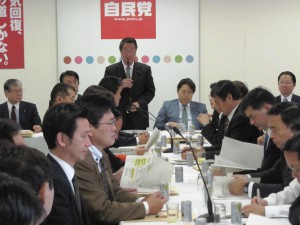
Takamori Yoshikawa, head of the Liberal Democratic Party’s project team to
discuss revision of the Agricultural Co-operative Society Law, speaks at the
team’s meeting held in Tokyo on Tuesday, Jan. 20.
The ruling Liberal Democratic Party’s project team held its first meeting on Tuesday, Jan. 20, to discuss revision of the Agricultural Co-operative Society Law. Many of some 130 lawmakers with farming connections who attended the meeting expressed opposition to the government’s proposals, including letting outside accountants conduct audits of primary agricultural co-ops and restricting non-farmers’ use of JAs’ services. They also stressed the importance of reflecting farmers’ voices in the process of revision. The government plans to compile a bill to revise the law early next month, but it would be difficult for the parties concerned to reach a consensus on the issue.
Lower House member Takamori Yoshikawa who heads the project team told reporters after the meeting that their task is to set the framework for the bill in line with the party’s draft plan issued in June, before the government puts together the bill. He said they should hurry up, as the government is scheduled to submit the bill to the ordinary Diet session in mid-March.
The meeting opened with agriculture ministry officials’ comments on the current conditions of the JA group and the party’s draft plan which respects the JA group’s self-reform efforts. Regarding the issue of auditing primary JAs, many lawmakers objected to introducing audits by certified public accountants. They said the current auditing by the Central Union of Agricultural Co-operatives (JA-Zenchu) would be better because it includes both financial and management audits and is more cost-efficient.
Many of them were also cautious about restricting non-farmer members’ use of JA’s services, saying that JAs have the role to serve as the infrastructure provider not only for farmers but for rural communities as a whole.
Some pointed out that although it is necessary to conduct reform, it should be carefully discussed, taking into account opinions from the farming sector and regional areas. The LDP has pledged in its campaign platform for the Lower House election held last month to “deepen discussion and make a steady progress” on agricultural co-operative reform.
The project team is expected to hold a couple more meetings later this week to listen to the opinions of the JA group and discuss other issues such as reforming the agricultural committees in municipalities which manage farmland transactions and agricultural production corporations. LDP’s coalition partner Komeito will also begin discussions on agricultural co-op reform on Wednesday, Jan. 21, at the agriculture revitalization committee headed by Lower House member Noritoshi Ishida.
Central union’s auditing takes away primary JAs’ self-responsibility: government
Government officials said Tuesday, Jan. 20, that they consider the current system of the Central Union of Agricultural Co-operatives (JA-Zenchu) conducting audits on primary JAs is preventing individual JA’s directors from having a sense of responsibility in management.
At a meeting of the Liberal Democratic Party’s project team on revision of the Agricultural Co-operative Society Law, agriculture ministry officials pointed out that not all heads of primary JAs necessarily are performing their task with a sense of self-awareness and responsibility as managers. They said it is questionable whether they can be responsible under the situation in which JA-Zenchu conducts auditing on primary JAs’ books and operations every year and supervise their management.
Chief Cabinet Secretary Yoshihide Suga also said at a regular press conference that from the standpoint of primary JAs, JA-Zenchu’s auditing coupled with management supervision is equivalent to receiving the central union’s consulting services every year. As a result, primary JAs’ directors tend to have a weaker sense of self-awareness or responsibility as managers, he added.
The ministry officials said that they have constantly been worried whether JA-Zenchu’s financial audits would be durable in the future, considering that co-operative regional financial institutions (Shinkin banks) and credit unions are required to have their accounts audited by certified public accountants since 1996. However, in a report issued in 2013, the ministry said JA-Zenchu’s audits maintain sufficient quality.
Meanwhile, regarding former agriculture minister Masatoshi Wakabayashi’s remarks made in 2007 that JA-Zenchu’s audits and management supervision are functioning effectively like a pair of wheels and should not be replaced with audits by outside accountants, the officials said the situation has changed. The government and the LDP are now discussing how to reform the JA group’s organization and businesses centered on JA-Zenchu, and it is necessary to consider it from different angles, they said.
Concerning the relationship between abolishing JA-Zenchu’s auditing and improving farmers’ income, the officials refrained from elaborating, only stating that the issue is how to reform the JA group as a whole, including primary JAs, JA-Zenchu and the National Federation of Agricultural Co-operative Associations (JA Zen-Noh).
As for the costs required if primary JAs replace JA-Zenchu’s audits with those by outside accountants, the ministry gave as a reference JPY6.89 million paid by Shinkin banks and credit unions with savings of JPY200 billion or less. But they added that it could cost more, since primary JAs are engaged in operations other than the credit business. According to the ministry, JA-Zenchu’s audits cost JPY8.77 million, but each primary JA’s actual payment is roughly JPY4 million, because JA-Zenchu’s auditing is paid by levies collected from primary JAs and other associations in the JA group such as JA Zen-Noh bears half of the expenses.
(Jan. 21, 2015)

